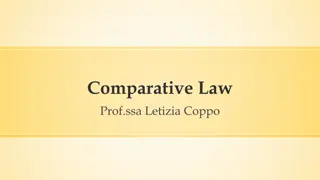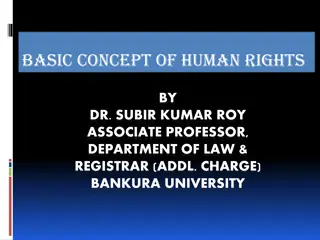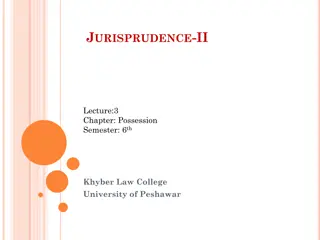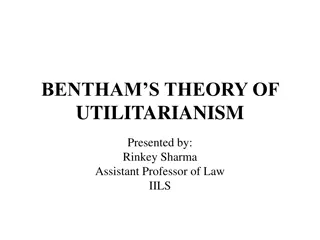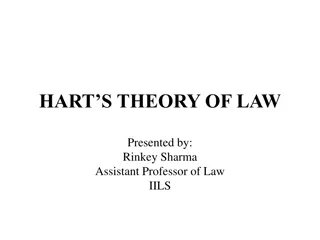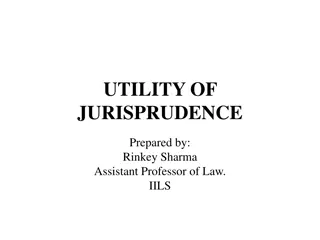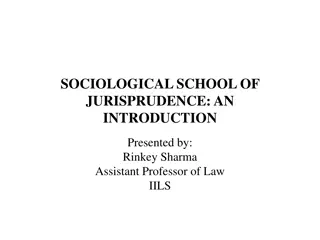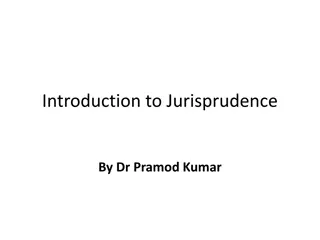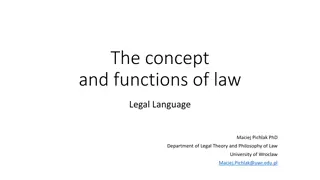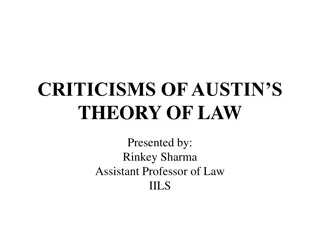Austin's Theory of Law in Jurisprudence
Austin's Imperative Theory of Law, presented by Assistant Professor Rinkey Sharma, delves into the foundational concepts of English jurisprudence as formulated by Austin. His work categorizes jurisprudence into general and particular aspects, exploring principles common to various legal systems and specific to individual countries. Austin's definition of law emphasizes the role of rules set by politically superior entities for those subject to them, outlining the elements of command, sanction, duty, and sovereignty within positive law. This Imperative Theory views law as commands imposed by a sovereign, backed by threats of sanctions, and obligations of obedience.
Download Presentation

Please find below an Image/Link to download the presentation.
The content on the website is provided AS IS for your information and personal use only. It may not be sold, licensed, or shared on other websites without obtaining consent from the author.If you encounter any issues during the download, it is possible that the publisher has removed the file from their server.
You are allowed to download the files provided on this website for personal or commercial use, subject to the condition that they are used lawfully. All files are the property of their respective owners.
The content on the website is provided AS IS for your information and personal use only. It may not be sold, licensed, or shared on other websites without obtaining consent from the author.
E N D
Presentation Transcript
AUSTINS THEORY OF LAW Presented by: Rinkey Sharma Assistant Professor of Law IILS
AUSTINS IMPERATIVE THEORY OF LAW Austin is known as father of English jurisprudence. According to him, Jurisprudence are divided into two categories: 1. General Jurisprudence: it is also known as General Expositorial. According to jurisprudence deals with: i. Principles and distinctions which are common to various system. ii. Exposition of the principles, notions and distinctions which are common to the different systems of law. Example: the concept of possession, personality comes under the province of general jurisprudence. him, study of General rights &Duties, ownership,
2. Particular jurisprudence: it is also known as particular expositorial. It is a study of particular system of law. Its field is confined to one particular country and is, therefore, sometimes termed as national jurisprudence. General jurisprudence has a wider scope than particular jurisprudence. It may, however, be noted that the meeting ground of Austin s general and particular jurisprudence is positive law, in so far as in each case matter comes out of positive law. While in the former case positive law common to all system is taken into consideration, in the latter case we are concerned with particular system of (positive) law.
AUSTINS DEFINITION OF LAW According to Austin law is aggregate of rules set by men politically superior or sovereign to men as politically subject. He defined law as rule laid down for the guidance of an intelligent being by an intelligent being having power over him.
LAW LAW SET BY MEN TO MEN (HUMAN LAWS) LAW SET BY GOD TO MEN (LAW OF GOD) LAW LAW PROPERLY SO CALLED IMPROPER LY SO CALLED RULES WHICH ARE NOT SET DIRECTLY/ INDIRECT LY BY A POLITICAL LAW SET BY POLITICAL SUPERIOR TO POLITICAL SUBORDINATE LAW SET BY SUBJECTS AS PRIVATE PERSON IN PURSUANCE OF LEGAL RIGHTS GRANTED TO
According to Austin, positive law has four element, namely, Command, Sanction, Duty Sovereignty. He believed that every law is a command given by a Sovereign, imposing a duty, enforced by sanction. Thus, he strongly believed that law is sovereign s command carrying with it threat of evil which is called sanction, and the party commanded and threatened is under an obligation (duty) to obey it. Austin s theory of law is known as Imperative theory of law.
ELEMENTS OF LAW 1. COMMAND Definition: According to Austin, commands are expressions of desire by superiors to inferiors. Non compliance results in evil. Declaration of a will in a directive manner. Division of command He divided command into two categories: 1. General command: they are given for the guidance of whole community. 2. Particular command: they are issued for the guidance of a particular or specific individual.
Example: suppose the lawgiver commands that thieves shall be hanged. This is a general command. Now suppose A committed theft and the judge commands that the thief i.e., A shall be hanged in accordance to the command given by the Sovereign. This is a Particular command. According to Austin, only general commands are law.
In other words, he said that: i. Laws are general commands. ii. General command must be continuous Exception However, Austin accepts that there are three kinds of law which, though not commands, may be included within the purview of law by way of exception. They are: i. Declaratory or Explanatory Laws: these laws are passed merely to explain the law which is already in force. Hence these are not command. ii. Laws of repeal: he does not treat such laws as commands because they are in fact the revocation of a command. iii. Laws of imperfect obligation: are those obligation where its non fulfillment does not result in sanction. Example: Charity, gratitude etc.
2. SANCTION Non obedience of command will result in sanction i.e., punishment (evil consequences). Sanction is necessary to enforce law. 3. DUTY All subjects inferior to Sovereign are under obligation to obey the command of the sovereign. Duty is compulsory in nature. Sovereign himself is under no obligation to follow his.
4. SOVEREIGN He defined Sovereign as if a determinate human Superior, not in the habit of obedience to a like superior, receives habitual obedience from the bulk of a given society, that determinate superior is sovereign in that society and the society (including the Superior) is a society political and independent. According to Austin, the sovereign must be illimitable, indivisible and Continuous.



